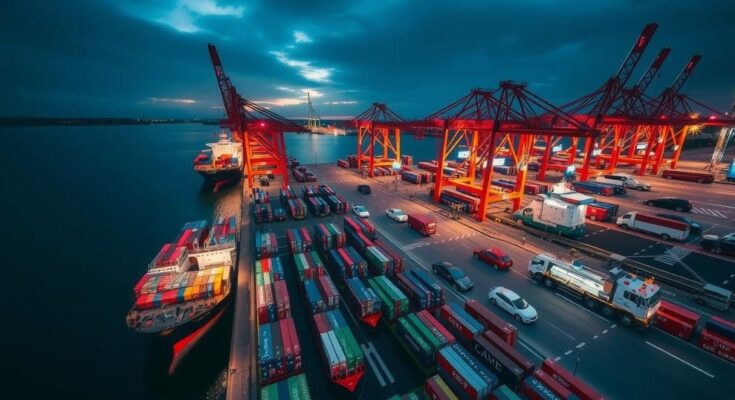Discussions in Brussels revolved around port decarbonization, the implications of climate change on refugee migration, and logistics strategies. Experts forecast that as fossil fuel transport declines, ports will face financial pressures and must navigate the complexities of transitioning to low-carbon energy solutions. A greater need to address the economic impacts of climate-induced displacement was also highlighted as critical for future policy considerations.
The recent discussions in Brussels centered around essential topics such as port decarbonization and the economics of climate refugees, alongside logistics strategies aimed at addressing the imminent challenges posed by climate change. The focal point of these conversations was the book launch of “Supergrid Super Solution: A Handbook for Energy Independence and a Europe Free from Fossil Fuels.” Among the key participants were experts from transportation, energy decarbonization sectors, and academia, who shared profound insights into the future landscape of port operations in light of maritime decarbonization. Particularly, it was highlighted that approximately 40% of all bulk goods transported through major ports globally consist of fossil fuels, a composition that is projected to dramatically decline as the world shifts away from fossil fuel dependence. The discussion delineated how ports must prepare for a transition from bulk flows of fossil fuels to a burgeoning container market which may not compensate for the loss in cargo tonnage, potentially leading to financial strain and increased competition among ports. Furthermore, it was considered that logistical adaptations are urgently required, especially as ports must also embrace the practices of bunker and supply low-carbon energy alternatives. The potential transition to a multi-fuel future within port operations is highlighted as complicated, necessitating substantial adjustments. Notably, the discussion around energy sources deemed unsustainable, such as ammonia, hydrogen, and nuclear power, concluded that these solutions may not be viable in the long term due to safety and logistical challenges. Alongside discussions on port decarbonization, the economic implications of climate change, particularly concerning climate refugees, were scrutinized. The article notes occurrences like the Syrian refugee crisis, illustrating the direct link between climatic events and human displacement, leading to regional instability and heightened political tensions in Europe and the United States. The need for economic research to better understand and model the impacts of climate displacement was emphasized as a critical area lacking focus.
The article provides insights into the pressing issues facing ports as they prepare for a future that increasingly disfavor fossil fuel dependence. With climate change accelerating the need for decarbonization, major ports worldwide will experience significant shifts in transport dynamics, necessitating a reevaluation of both logistics strategies and economic models. The discourse also reflects upon the broader consequences of climate change, such as displacement and migration challenges that threaten global stability and economic viability.
In conclusion, the discussions within Brussels highlighted the urgent need for ports to innovate and transition towards decarbonization amidst declining revenues from fossil fuel bulk transport. Additionally, the economic models assessing climate change impacts, especially concerning climate refugees, require greater attention to inform policy and strategic planning. With collaborative efforts among stakeholders, substantial strides can be made towards a more sustainable future in logistics and energy sectors.
Original Source: cleantechnica.com




